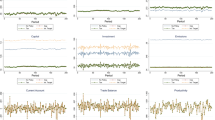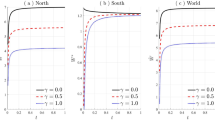Abstract
In this paper I examine the question of the choice of environmental policy instruments in the context of a model of strategic international trade between countries, and I show that in such a model there is a preference for the use of standards rather than taxes as policy instruments. The paper employs a simple model of two countries who are the sole producers of a commodity sold on the world market. Production uses an input which is directly related to the emission of a pollutant, and each country has a fixed target for the emissions level it wishes to achieve. If trade is modelled as a one—shot Cournot equilibrium, the countries are indifferent about policy choice. If trade is modelled as a Stackelberg equilibrium, then both countries are better off (in terms of producer surplus) if the follower uses standards. Finally, if trade is modelled as a two— stage Cournot game in capacity and output then the choice of standards by both countries is a Nash equilibrium, and Pareto dominates the choice of taxes by both countries. These results arise from the superior commitment properties of standards.
Comments by participants at the conference, and by Larry Karp and Tony Venables are greatfully acknowledged.
Access this chapter
Tax calculation will be finalised at checkout
Purchases are for personal use only
Preview
Unable to display preview. Download preview PDF.
Similar content being viewed by others
References
Brander, J., and Spencer, B., 1983, “Strategic commitment with R&D: The symmetric case”, The Bell Journal of Economics 14, 225–235
Buchanan, J., and Tullock, G., 1975, “Polluters profits and political response: Direct controls versus taxes”, American Economic Review 65, 139–147
de Zeeuw, A., and van der Ploeg, R., 1990, “International Aspects of Pollution Control”, Working Paper, Center for Economic Research, University of Tilburg
Hahn, R.W., 1989, “Economic prescriptions for environmental problems: How the patient followed the doctor’s orders”, The Journal of Economic Perspectives, 3, 95–114
Hoel, M., 1990, “Emission taxes in a dynamic game of CO 2 emissions”, Memorandum 7, Department of Economics, Oslo
Ingham, A., and Ulph, A., 1990, “The economics of global warming”, in: Bennett, J. (ed), Economics and the Environment, Australian Institute for Public Policy, Perth
Karp, L., 1990, “A comparison of tariffs and quotas in a strategic setting”, Working Paper, University of Southampton
Kwerel, E., 1977, “To tell the truth: Imperfect information and optimal pollution control”, Review of Economic Studies 44, 595–601
Opschoor, J. B., and Vos, H.B., 1989, “Economic Instruments for Environmental Protection”, O.E.C.D., Paris
Pearce, D.W., and Turner, K., 1990, “Economics of Natural Resources and the Environment”, Harvester Wheatsheaf, Hemel Hempstead
Roberts, M., and Spence, M., 1976, “Effluent charges and licenses under uncertainty”, Journal of Public Economics 5, 193–208
Spencer, B., and Brander, J., 1983, “International R&D rivalry and industrial strategy”, Review of Economic Studies 50, 707–722
Ulph, A., 1991, “Strategic International Trade and Environmental Policy”, (mimeo, University of Southampton)
Yohe, G., 1976, “Polluters’ profits and political response: Direct control versus taxes: Comment”, American Economic Review 66, 981–982
Editor information
Editors and Affiliations
Rights and permissions
Copyright information
© 1992 Springer-Verlag Berlin · Heidelberg
About this paper
Cite this paper
Ulph, A. (1992). The Choice of Environmental Policy Instruments and Strategic International Trade. In: Pethig, R. (eds) Conflicts and Cooperation in Managing Environmental Resources. Microeconomic Studies. Springer, Berlin, Heidelberg. https://doi.org/10.1007/978-3-642-46765-3_6
Download citation
DOI: https://doi.org/10.1007/978-3-642-46765-3_6
Publisher Name: Springer, Berlin, Heidelberg
Print ISBN: 978-3-642-46767-7
Online ISBN: 978-3-642-46765-3
eBook Packages: Springer Book Archive




